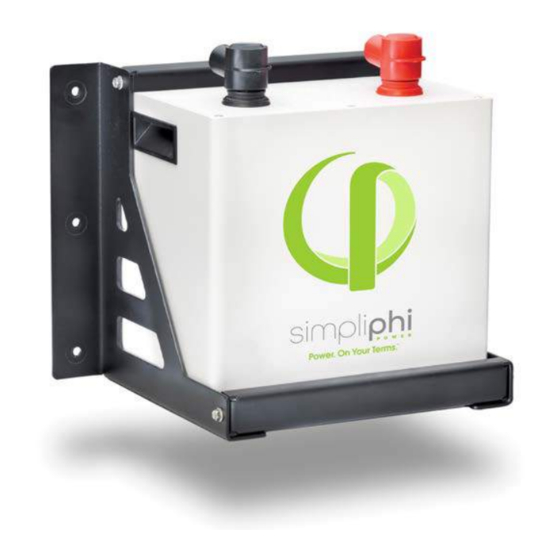
Table of Contents
Advertisement
Quick Links
Advertisement
Table of Contents

Summary of Contents for SimpliPhi PHI 2.7
- Page 1 Power. On Your Terms. PHI 2.7 Battery INSTALLATION MANUAL Optimized Energy Storage & Management for Residential & Commercial Applications Utilizing Efficient, Safe, Non-Toxic, Energy Dense Lithium Ferrous Phosphate (LFP) Chemistry. © SIMPLIPHI POWER, INC. REV022618...
- Page 2 PHI 2.7 kWh Battery. SimpliPhi Power, Inc. | 420 Bryant Circle | Ojai, CA 93023, USA | (805) 640-6700 | info@simpliphipower.com | SimpliPhiPower.com...
-
Page 3: Table Of Contents
Appendix A – Material Safety Data Sheet .................15 Appendix B – PHI 2.7 Battery Safety & Green Attributes, Certifications ........17 SimpliPhi Power, Inc. | 420 Bryant Circle | Ojai, CA 93023, USA | (805) 640-6700 | info@simpliphipower.com | SimpliPhiPower.com | 3 |... -
Page 4: Important Safety Information
Do not operate the unit with damaged or substandard wiring. Do not operate if the PHI 2.7 Battery has been damaged in any way during shipping or otherwise. Only use a SimpliPhi approved LFP battery charger if ancillary charging is required before installation, testing or troubleshooting. - Page 5 PHI 2.7 Battery, the electrolyte can be ignited by an open flame. However, unlike other lithium ion batteries (LCO) there are no hazardous or toxic materials in the electrolyte or the material components of PHI 2.7 Batteries.
-
Page 6: Explosive Gas Precautions
1.2.2 – Charging at Temperatures Below Freezing It is important to take necessary steps to determine the temperature of the PHI 2.7 Battery prior to charging the battery, as the battery may otherwise be adversely impacted. CAUTION: Do not attempt to charge the PHI 2.7 Battery below 32°... -
Page 7: Product Description
Battery performance parameters to be aware of during the design process, guidance on system sizing, as well as mounting hardware and PHI 2.7 Battery weight. SimpliPhi Power, Inc. | 420 Bryant Circle | Ojai, CA 93023, USA | (805) 640-6700 | info@simpliphipower.com | SimpliPhiPower.com... -
Page 8: Phi 2.7 Battery Performance Parameters And Sizing Calculations
SimpliPhi Power PHI 2.7 Batteries can be mounted in practically any orientation (terminals up or on any side), with no impact to the performance of the PHI 2.7 Battery. Do not install them upside down. The brackets can be mounted directly to a wall or can be arranged on strut channels for ease of positioning (mounting hardware not included). -
Page 9: Battery Wall Mount + Bracket Dimensions
3.5 – Battery Wall Mount + Bracket Dimensions Please see the table below for physical dimensions of the PHI 2.7 Battery both with, and without, the SimpliPhi Power Mounting Bracket, as well as a diagram that provides guidance on Mounting Bracket assembly. -
Page 10: Installation & Wiring
Use identical wire construction from each PHI 2.7 Battery terminal to the common bus. All PHI 2.7 Batteries are designed to serve at a fixed voltage range in parallel arrangements for maximum available amperage and storage capacity. PHI 2.7 Batteries are not designed to be arranged in series for increased voltage. - Page 11 Figure 3.0 represents two PHI 2.7 Batteries in Parallel. Wire lengths from PHI 2.7 Batteries should be identical in length and gauge in order to balance the load across (all) PHI 2.7 Batteries in the installation. Identical wiring length is a critical feature of parallel power storage systems that must be adhered to throughout all parallel wiring instructions.
-
Page 12: Torque Values
A brief small spark is often present when connecting the second of two leads to a PHI 2.7 Battery. Example: If the Positive has been connected, a small spark will likely be present when connecting the Negative lead. This is a normal occurrence. Complete all connections in a clean, ventilated, well-lit area. -
Page 13: Programming
24 hours (10% at top of charge and 10% at bottom of charge). This allows a system to stay online until at least one full day of sun can recharge the PHI 2.7 Battery bank. -
Page 14: Simpliphi Technical Support
6.0 – SimpliPhi Technical Support For technical support related to your PHI 2.7 Battery, please contact us as follows: 805.640.1874 techsupport@simpliphipower.com SimpliPhi Power, Inc. | 420 Bryant Circle | Ojai, CA 93023, USA | (805) 640-6700 | info@simpliphipower.com | SimpliPhiPower.com | 14 | REV022618... -
Page 15: Appendix A - Material Safety Data Sheet
Under normal use, the PHI 2.7 Battery does not expose the user to hazardous ingredients. USA: The PHI 2.7 Battery is an article pursuant to 29 CFR 1910.1200 and, as such, is not subject to the OSHA Hazard Communication Standard Requirement. - Page 16 Skin: Contact between the PHI 2.7 Battery and skin will not cause any harm. Skin contact with positive and negative terminals of high voltages may cause burns to the skin. Skin contact with a ruptured PHI 2.7 Battery can cause skin irritation.
-
Page 17: Appendix B - Phi 2.7 Battery Safety & Green Attributes, Certifications
Appendix B – PHI 2.7 Battery Safety & Green Attributes, Certifications This Appendix section covers the PHI 2.7 Battery safety attributes and certifications, such as the lack of thermal runaway and off-gassing, UN DOT certification and UL compliance. It also covers the PHI 2.7 Battery’s green attributes –... - Page 18 This is especially true when compared to those of lead acid, NiCad, and NiMH batteries. B.2.2 – By Products There are no toxic by-products associated with the assembly or use of PHI 2.7 Batteries, such as off-gassing hydrogen, sulfuric acid spillage, lead contamination, or explosive chemicals. B.2.3 – Operation There is no need for maintenance, such as adding water or chemicals, nor is there corrosion of terminals or containment facilities, or dispersion of fumes as with other battery types.


Need help?
Do you have a question about the PHI 2.7 and is the answer not in the manual?
Questions and answers